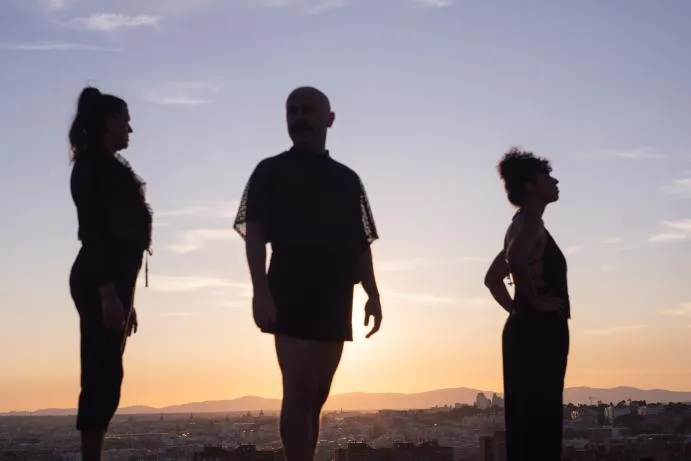Cuerpo-Travesía
Fecha
OCT 2024 - MAY 2025
Horario
Weekly meetings at Matadero Madrid aimed at specific audiences, coordinated by Marina Santo and Javier Vaquero.
Cuerpo-Travesía is a cultural mediation initiative led by Javier Vaquero and Marina Santo at Intermediae Matadero, which uses tools from the body in movement to create a meeting space and community for refugees and asylum seekers in Spain. Taking place at Matadero from October 2024 to May 2025, the project offers weekly movement sessions to facilitate and highlight the identitarian connection and collective expression of the participants and to explore their experiences and their relationship with dance.
Asylum seekers in Spain have had to flee conflict, persecution and human rights violations, leaving behind their homes and everything they have ever known. In this difficult adaptation process, culture and identity play a key role to play in the search for and incorporation of a possible sense of home. Born out of this conviction, Body-Journeysets out to create a welcoming and healthy environment where dance can help participants connect with each other and build a sense of community and belonging.
Cuerpo-Travesía seeks to be a dynamic and sensitive space where we can meet, participate and recognise the humanity that binds us all, regardless of our diverse legal situations. The sessions are intended to allow us to collectively build a place where caring, listening and creativity become a form of refuge for all the participants. A space where the opportunity to come into contact with the creative body and its language – dance – can provide some support during their time in Madrid.
Who is it for?
Adults who are currently seeking or have sought asylum. We recognise that people may migrate and seek refuge in other countries for a variety of reasons, including poverty, and that, our target audience may therefore be quite diverse and not limited to a specific legal situation.
What are we going to do?
Employing a range of practices such as somatic movement, improvisation, traditional dance and choreographic creation, we will prepare weekly sessions during which the participants will be able to dance and reflect on their experiences as part of the diaspora. At the end of the process, we will hold a public exhibition to share all that has happened, as well as a documentary and digital compilation of the participants’ experiences.
What commitments do the participants have to make?
We understand that the realities of our target public may be quite diverse in terms of their stability in our country and their future prospects. In view of this, we have designed different forms of participation so that everyone can be involved in the project according to their means and wishes. Some may be able to attend all the sessions of the project (if they so wish), while others will be able to come and go throughout the course in accordance with their needs and availability. Facilitators and participants shall engage in an active dialogue throughout the process.
Who is leading the project?
The project and course leaders are Marina Santo and Javier Vaquero, and there will also be a number of guest facilitators who will share their knowledge of dance and refugee, asylum and diaspora processes.
Marina Santo (Rio de Janeiro, 1978) has been a professional dancer for almost twenty years and since 2010, as well as collaborating with institutional projects, she has created and presented her own projects to introduce contemporary dance to a broad cross-section of people, including women, public school teachers, young people, diaspora/racialised people and the LGBTQIA+ community. She has worked with more than 35 Spanish and international institutions, including: Telefónica Foundation, La Caixa, Action Against Hunger, Adsis Foundation, La Parceria and Espacio Afro. In 2022, she received the Art for Change Scholarship from the La Caixa Foundation. + info
Javier Vaquero (Toledo, 1984) trained as a dancer in Codarts, the Netherlands. He has worked with numerous choreographers in both Europe and Latin America. He has taught at the Xavierian University (Bogota, Colombia) and the Catholic University (Lima, Peru). He currently lives in Madrid, where he works in mediation and community dance for institutions such as the Reina Sofía Museum, the Condeduque Centre for Contemporary Culture, the Fernán Gómez Theatre and La Casa Encendida, among others. He is also a member of Laintersección, where he carries out social communication work on human rights issues. +info
Cuerpo-Travesía project is part of "Experimental Methodologies", Intermediae’s methodological innovation programme, which in 2024-2025 is focusing on methodologies derived from the performing arts and the body in movement.
Photo by Anna Fux (2024)



 Intermediae
Intermediae



